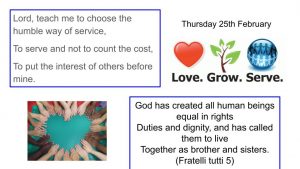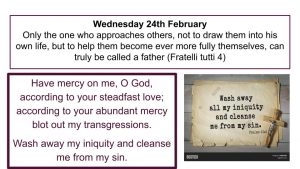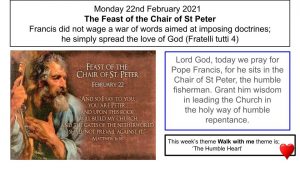
Hearing and Speaking the Word of God
They were exceedingly astonished and they said, “He has done all things well. He makes the deaf hear and the mute speak.” Mark 7:37
This line is the conclusion to the story of Jesus healing a deaf man who also had a speech impediment. The man was brought to Jesus, Jesus took him off by himself, cried out “Ephphatha!” (that is, “Be opened!”), and the man was cured. And though this was an incredible gift to this man and an act of great mercy toward him, it also reveals that God wants to use us to draw others to Himself.
On a natural level, we all lack the ability to hear the voice of God when He speaks. We need the gift of grace for this. As a result, on a natural level, we are also incapable of speaking the many truths that God wants us to speak. This story teaches us that God also desires to heal our ears so as to hear His gentle voice and to loosen our tongues so that we can become His mouthpiece.
But this story is not only about God speaking to each one of us; it also reveals our duty to bring others to Christ who do not know Him. The friends of this man brought him to Jesus. And Jesus took the man off by himself. This gives us insight into how we help others to come to know our Lord’s voice. Oftentimes when we want to share the Gospel with another, we tend to talk to them and try to rationally convince them to turn their lives to Christ. And though this can bear good fruit at times, the real goal we must have is to help them to go off with our Lord by themselves for a while so that Jesus can do the healing.
If your ears have truly been opened by our Lord, then your tongue will also be loosened. And only if your tongue is loosened will God be able to draw others to Himself through you. Otherwise your act of evangelizing will only be based on your effort alone. Therefore, if you have people in your life who do not appear to be listening to the voice of God and following His holy will, then first and foremost commit yourself to listening to our Lord yourself. Let your ears hear Him. And when you do hear Him, it will be His voice that, in turn, speaks through you in the way He desires to reach out to others.
Reflect, today, upon this Gospel scene. Ponder, especially, the friends of this man as they are inspired to bring him to Jesus. Ask our Lord to use you in a similar way. Prayerfully ponder those in your life whom God wants to call to Himself through your mediation and place yourself at the service of our Lord so that His voice can speak through you in the way He chooses.
My good Jesus, please open my ears to hear all that You wish to say to me and please loosen my tongue so that I will become a mouthpiece of Your holy word to others. I offer myself to You for Your glory and pray that You will use me in accord with Your holy will. Jesus, I fully trust in You.

A Gentiles Faith
Soon a woman whose daughter had an unclean spirit heard about him. She came and fell at his feet. The woman was a Greek, a Syrophoenician by birth, and she begged him to drive the demon out of her daughter. Mark 7:25–26
A parent’s love is powerful. And the woman in this story clearly loves her daughter. It is that love that drives this mother to seek out Jesus in the hope that He will free her daughter from the demon who possessed her. Interestingly, this woman was not of the Jewish faith. She was a gentile, a foreigner, but her faith was very real and very deep.
When Jesus first encountered this woman, she begged Him to free her daughter from the demon. Jesus’ response was at first surprising. He said to her, “Let the children be fed first. For it is not right to take the food of the children and throw it to the dogs.” In other words, Jesus was saying that His mission was first to the people of Israel, the chosen people of the Jewish faith. They were the “children” of whom Jesus was speaking, and the gentiles, such as this woman, were the ones referred to as “the dogs.” Jesus spoke this way to this woman not out of rudeness but because He could see her deep faith, and He wanted to give her an opportunity to manifest that faith for all to see. And so she did.
The woman responded to Jesus, “Lord, even the dogs under the table eat the children’s scraps.” Her words were not only exceptionally humble but were also based on deep faith and a deep love for her daughter. As a result, Jesus responds with generosity and immediately frees her daughter from the demon.
In our own lives, it’s easy to fall into the trap of thinking we deserve the mercy of God. We can think that we have a right to God’s grace. And even though Jesus deeply desires to pour forth His grace and mercy in superabundance on our lives, it is essential that we fully understand our unworthiness before Him. The disposition of this woman’s heart sets for us a perfect example of how we must come to our Lord.
Reflect, today, upon the beautiful example of this woman of deep faith. Prayerfully read her words over and over. Try to understand her humility, her hope, and her love for her daughter. As you do, pray that you will be able to imitate her goodness so as to share in the blessings she and her daughter received.
My merciful Lord, I trust in Your perfect love for me and for all peoples. I pray especially for those who carry heavy burdens and for those whose lives are deeply intertwined with evil. Please set them free, dear Lord, and welcome them into Your family so that they become true children of Your Father. May I have the humility and faith I need to help bring forth this abundance of grace for others. Jesus, I trust in You.

That Which is Within
Jesus summoned the crowd again and said to them, “Hear me, all of you, and understand. Nothing that enters one from outside can defile that person; but the things that come out from within are what defile.” Mark 7:14–15
What is within you? What is in your heart? Today’s Gospel concludes with a list of vices that sadly come from within: “evil thoughts, unchastity, theft, murder, adultery, greed, malice, deceit, licentiousness, envy, blasphemy, arrogance, folly.” Of course, none of these vices are desirable when looked at objectively. They are all quite repulsive. And yet too often they are sins that people deal with on a regular basis to one extent or another.
Take greed, for example. When understood clearly, no one wants to be known as one who is greedy. It’s a shameful attribute to have. But when greed is not looked at as greed, it’s easy to fall into the trap of living it. One who is greedy desires an excessive amount of this or that. More money, a better house, a nicer car, more luxurious vacations, etc. Thus, when a person is acting in a greedy way, greed does not seem undesirable. It’s only when greed is looked at in an objective way that it is understood for what it is.
In this Gospel, by naming this long list of vices, Jesus does us an incredible act of mercy. He rattles us and calls us to step back and look at sin for what it is. Jesus also makes it clear that when you live one or more of these vices, you become defiled. You become greedy, a liar, cruel, a gossip, hateful, arrogant, etc. Objectively speaking, no one wants this.
What is it in that list of vices that you struggle with the most? What do you see within your own heart? Be honest with yourself before God. Jesus desires that your heart be pure and holy, freed from these and every filth. But unless you are able to look at your own heart with honesty, it will be difficult to reject the sin with which you struggle.
Reflect, today, upon this list of sins identified by our Lord. Consider each one and allow yourself to see each sin for what it truly is. Allow yourself to despise these sins with a holy wrath and then turn your eyes to that sin with which you struggle the most. Know that as you consciously see that sin and reject it, our Lord will begin to strengthen you and purify your heart so that you become freed from that defilement and become, instead, the beautiful child of God you were made to be.
My merciful Lord, help me to see sin for what it is. Help me, especially, to see my own sin—that sin within my own heart that defiles me as Your dear child. As I see my sin, give me the grace I need to reject it and to turn to You with all my heart so that I can become a new creation in Your grace and mercy. Amen
During tutor time all our students had the opportunity to take part in the Safer Internet Day virtual assembly.
Watch here: http://bit.ly/3rDzwWp.
Make the most out of your time online by taking a look at these top tips this Safer Internet Day. From double-checking information to questioning the source, these top tips look at all the things that you should be free to be online.
Top Tips: http://bit.ly/3a0ACVZ
Worship From the Heart
When the Pharisees with some scribes who had come from Jerusalem gathered around Jesus, they observed that some of his disciples ate their meals with unclean, that is, unwashed, hands. Mark 7:6–8
It seems quite clear that Jesus’ instant fame led these religious leaders to jealousy and envy, and they wanted to find fault with Him. As a result, they carefully observed Jesus and His disciples, and they noticed that Jesus’ disciples were not following the traditions of the elders. So the leaders began questioning Jesus about this fact. Jesus’ response was one of severe criticism of them. He quoted Isaiah the prophet who said, “This people honors me with their lips, but their hearts are far from me; in vain do they worship me, teaching as doctrines human precepts.”
Jesus strongly criticised them because their hearts were lacking true worship. The various traditions of the elders were not necessarily bad, such as the careful ceremonial washing of one’s hands before eating. But these traditions were empty if they were not motivated by a deep faith and love of God. The external following of human traditions was not truly an act of divine worship, and that’s what Jesus wanted for them. He wanted their hearts to be set ablaze with a love of God and with true divine worship.
What our Lord wants of each one of us is worship. Pure, heartfelt, sincere worship. He wants us to love God with a deep interior devotion. He wants us to pray, to listen to Him, and to serve His holy will with all the powers of our soul. And this is only possible when we engage in authentic worship.
As Catholics, our life of prayer and worship is grounded in the holy Liturgy. The Liturgy incorporates many traditions and practices that reflect our faith and become a vehicle of the grace of God. And though the Liturgy itself is far different from the mere “tradition of the elders” that Jesus was criticizing, it’s useful to remind ourselves that the many Liturgies of our Church must move from the external actions to interior worship. Going through the motions alone is pointless. We must allow God to act on us and within us as we engage in the external celebration of the Sacraments.
Reflect, today, upon the burning desire in the heart of our Lord to draw you into worship. Reflect upon how well you allow yourself to be drawn into this worship every time you attend the holy Mass. Seek to make your participation not only an exterior one but, first and foremost, an interior one. Doing so will help ensure that the rebuke of our Lord upon the scribes and Pharisees does not also fall upon you.
My divine Lord, You and You alone are worthy of all worship, adoration and praise. You and You alone deserve the worship I offer You from the depths of my heart. Help me and Your entire Church to always interiorize our exterior acts of worship so as to give You the glory that is due Your holy name. Jesus, I trust in You.





